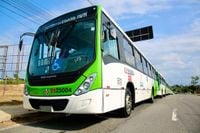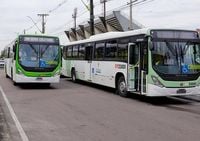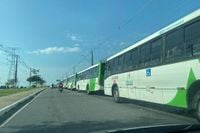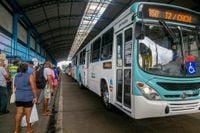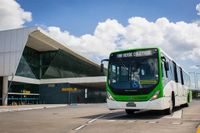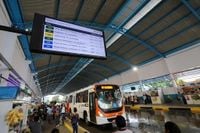On Tuesday, April 15, 2025, public transportation in Manaus is facing significant disruptions as bus drivers, represented by the Sindicato dos Trabalhadores Rodoviários de Manaus, have initiated a strike demanding better wages and the retention of conductors on buses. This strike comes after a series of unsuccessful negotiations with the Sindicato das Empresas de Transporte de Passageiros do Estado do Amazonas (Sinetram), which represents the bus companies in the region.
The strike was officially announced by Givancir Oliveira, the president of the bus drivers' union, who stated, "Our last resort is the strike; we have tried various negotiation attempts, but without success, so we are going to war." This declaration highlights the frustration among drivers, many of whom are concerned about their working conditions and job security.
Approximately 500,000 people rely on public transportation daily in Manaus, making the impact of the strike particularly significant. The union's decision to strike is in direct response to recent actions by the company Via Verde, which has introduced new buses that do not have designated seats for conductors. Instead, drivers are now expected to handle fare collection and provide change, a situation that many see as unmanageable.
Oliveira's comments came after a protest by Via Verde employees outside the Câmara Municipal de Manaus (CMM) on April 14, 2025, against the removal of conductor seats in the new buses. This protest was part of a broader effort to address concerns regarding the operational changes that have been implemented without adequate consultation or support for the workforce.
In light of the impending strike, Sinetram sought a court ruling to ensure that public transport would continue to operate at a reduced capacity. On the same day the strike was announced, the Tribunal Regional do Trabalho da 11ª Região issued a preliminary injunction requiring that at least 70% of the bus fleet operate during peak hours, specifically from 6:00 AM to 9:00 AM and from 5:00 PM to 8:00 PM. Outside of these peak periods, the requirement drops to 50% of the fleet. Failure to comply with this ruling could result in fines of R$ 60,000 per hour for the union.
The court also prohibited any blockades of company garages and mandated that any demonstrations must occur at least 150 meters away from the entrances of bus terminals. This decision aims to minimize disruption to the essential public service while balancing the workers' right to protest.
Councilman Jaildo Oliveira (PV) expressed concern over the operational changes implemented by Via Verde, stating, "The company insists on not complying with the law; they brought more than 30 buses without conductor seats, and we verified that all these buses were released without the conductor's seat. The driver will have to perform multiple functions, about ten at the same time." This statement underscores the potential safety and operational issues that could arise from the new bus configurations.
Law No. 2.923/2022 stipulates that fare payments should be made to conductors in conventional services and to drivers in complementary services. The removal of conductor seats in new buses raises questions about the legality and practicality of the current arrangements.
Despite the ongoing tensions, Sinetram has reiterated its commitment to dialogue with the workers. In a statement, they emphasized their openness to negotiations, suggesting that a resolution could still be reached without the need for a strike.
The implications of this strike extend beyond the immediate inconvenience for commuters; it reflects broader issues within the transportation sector in Manaus, including labor rights, working conditions, and the need for sustainable operational practices. As the situation develops, both the union and the bus companies will need to navigate these complex challenges to find a solution that meets the needs of workers while ensuring reliable transportation for the city's residents.
As the clock ticks down to the start of the strike, many in Manaus are left wondering how they will manage their daily commutes and what the future holds for public transportation in the city. The outcome of this labor dispute could set important precedents for labor relations in the region, influencing not only the bus drivers but also other sectors within the public transport system.
With the city's public transport system already under strain, the need for effective communication and negotiation between the union and the employers has never been more urgent. The residents of Manaus, who depend on these services, are watching closely as both sides prepare for what could be a pivotal moment in the city's transportation history.

